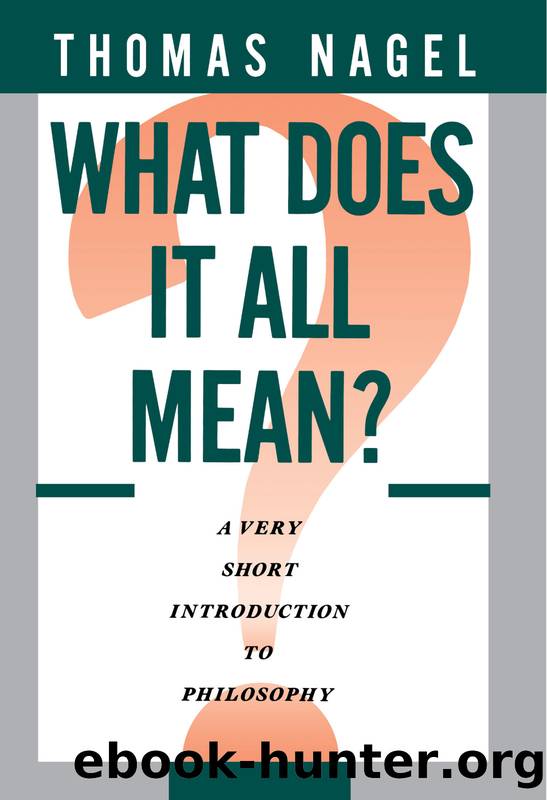What Does It All Mean? by Thomas Nagel

Author:Thomas Nagel
Language: eng
Format: epub
Publisher: Oxford University Press
Published: 1987-12-14T16:00:00+00:00
7
Right and Wrong
Suppose you work in a library, checking peopleâs books as they leave, and a friend asks you to let him smuggle out a hard-to-find reference work that he wants to own.
You might hesitate to agree for various reasons. You might be afraid that heâll be caught, and that both you and he will then get into trouble. You might want the book to stay in the library so that you can consult it yourself.
But you may also think that what he proposes is wrongâthat he shouldnât do it and you shouldnât help him. If you think that, what does it mean, and what, if anything, makes it true?
To say itâs wrong is not just to say itâs against the rules. There can be bad rules which prohibit what isnât wrongâlike a law against criticizing the government. A rule can also be bad because it requires something that is wrongâlike a law that requires racial segregation in hotels and restaurants. The ideas of wrong and right are different from the ideas of what is and is not against the rules. Otherwise they couldnât be used in the evaluation of rules as well as of actions.
If you think it would be wrong to help your friend steal the book, then you will feel uncomfortable about doing it: in some way you wonât want to do it, even if you are also reluctant to refuse help to a friend. Where does the desire not to do it come from; what is its motive, the reason behind it?
There are various ways in which something can be wrong, but in this case, if you had to explain it, youâd probably say that it would be unfair to other users of the library who may be just as interested in the book as your friend is, but who consult it in the reference room, where anyone who needs it can find it. You may also feel that to let him take it would betray your employers, who are paying you precisely to keep this sort of thing from happening.
These thoughts have to do with effects on othersânot necessarily effects on their feelings, since they may never find out about it, but some kind of damage nevertheless. In general, the thought that something is wrong depends on its impact not just on the person who does it but on other people. They wouldnât like it, and theyâd object if they found out.
But suppose you try to explain all this to your friend, and he says, âI know the head librarian wouldnât like it if he found out, and probably some of the other users of the library would be unhappy to find the book gone, but who cares? I want the book; why should I care about them?â
The argument that it would be wrong is supposed to give him a reason not to do it. But if someone just doesnât care about other people, what reason does he have to refrain from doing any of
Download
This site does not store any files on its server. We only index and link to content provided by other sites. Please contact the content providers to delete copyright contents if any and email us, we'll remove relevant links or contents immediately.
Machine Learning at Scale with H2O by Gregory Keys | David Whiting(4313)
Never by Ken Follett(3957)
Fairy Tale by Stephen King(3399)
Reminders of Him: A Novel by Colleen Hoover(3121)
The Man Who Died Twice by Richard Osman(3080)
Will by Will Smith(2920)
It Starts With Us (It Ends with Us #2) by Colleen Hoover(2367)
Rationality by Steven Pinker(2366)
Can't Hurt Me: Master Your Mind and Defy the Odds - Clean Edition by David Goggins(2341)
Friends, Lovers, and the Big Terrible Thing by Matthew Perry(2230)
The Becoming by Nora Roberts(2203)
The Stranger in the Lifeboat by Mitch Albom(2123)
Love on the Brain by Ali Hazelwood(2078)
New Morning Mercies: A Daily Gospel Devotional by Paul David Tripp(1919)
A Short History of War by Jeremy Black(1848)
HBR's 10 Must Reads 2022 by Harvard Business Review(1844)
The Strength In Our Scars by Bianca Sparacino(1843)
A Game of Thrones (The Illustrated Edition) by George R. R. Martin(1745)
Never Finished: Unshackle Your Mind and Win the War Within by David Goggins(1712)
